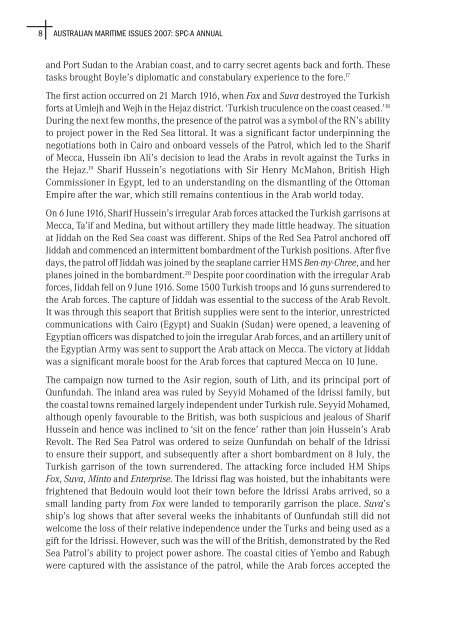Australian Maritime Issues 2007 - Royal Australian Navy
Australian Maritime Issues 2007 - Royal Australian Navy
Australian Maritime Issues 2007 - Royal Australian Navy
Create successful ePaper yourself
Turn your PDF publications into a flip-book with our unique Google optimized e-Paper software.
8 AUSTRALIAN MARITIME ISSUES <strong>2007</strong>: SPC-A ANNUAL<br />
and Port Sudan to the Arabian coast, and to carry secret agents back and forth. These<br />
tasks brought Boyle’s diplomatic and constabulary experience to the fore. 17<br />
The first action occurred on 21 March 1916, when Fox and Suva destroyed the Turkish<br />
forts at Umlejh and Wejh in the Hejaz district. ‘Turkish truculence on the coast ceased.’ 18<br />
During the next few months, the presence of the patrol was a symbol of the RN’s ability<br />
to project power in the Red Sea littoral. It was a significant factor underpinning the<br />
negotiations both in Cairo and onboard vessels of the Patrol, which led to the Sharif<br />
of Mecca, Hussein ibn Ali’s decision to lead the Arabs in revolt against the Turks in<br />
the Hejaz. 19 Sharif Hussein’s negotiations with Sir Henry McMahon, British High<br />
Commissioner in Egypt, led to an understanding on the dismantling of the Ottoman<br />
Empire after the war, which still remains contentious in the Arab world today.<br />
On 6 June 1916, Sharif Hussein’s irregular Arab forces attacked the Turkish garrisons at<br />
Mecca, Ta’if and Medina, but without artillery they made little headway. The situation<br />
at Jiddah on the Red Sea coast was different. Ships of the Red Sea Patrol anchored off<br />
Jiddah and commenced an intermittent bombardment of the Turkish positions. After five<br />
days, the patrol off Jiddah was joined by the seaplane carrier HMS Ben-my-Chree, and her<br />
planes joined in the bombardment. 20 Despite poor coordination with the irregular Arab<br />
forces, Jiddah fell on 9 June 1916. Some 1500 Turkish troops and 16 guns surrendered to<br />
the Arab forces. The capture of Jiddah was essential to the success of the Arab Revolt.<br />
It was through this seaport that British supplies were sent to the interior, unrestricted<br />
communications with Cairo (Egypt) and Suakin (Sudan) were opened, a leavening of<br />
Egyptian officers was dispatched to join the irregular Arab forces, and an artillery unit of<br />
the Egyptian Army was sent to support the Arab attack on Mecca. The victory at Jiddah<br />
was a significant morale boost for the Arab forces that captured Mecca on 10 June.<br />
The campaign now turned to the Asir region, south of Lith, and its principal port of<br />
Qunfundah. The inland area was ruled by Seyyid Mohamed of the Idrissi family, but<br />
the coastal towns remained largely independent under Turkish rule. Seyyid Mohamed,<br />
although openly favourable to the British, was both suspicious and jealous of Sharif<br />
Hussein and hence was inclined to ‘sit on the fence’ rather than join Hussein’s Arab<br />
Revolt. The Red Sea Patrol was ordered to seize Qunfundah on behalf of the Idrissi<br />
to ensure their support, and subsequently after a short bombardment on 8 July, the<br />
Turkish garrison of the town surrendered. The attacking force included HM Ships<br />
Fox, Suva, Minto and Enterprise. The Idrissi flag was hoisted, but the inhabitants were<br />
frightened that Bedouin would loot their town before the Idrissi Arabs arrived, so a<br />
small landing party from Fox were landed to temporarily garrison the place. Suva’s<br />
ship’s log shows that after several weeks the inhabitants of Qunfundah still did not<br />
welcome the loss of their relative independence under the Turks and being used as a<br />
gift for the Idrissi. However, such was the will of the British, demonstrated by the Red<br />
Sea Patrol’s ability to project power ashore. The coastal cities of Yembo and Rabugh<br />
were captured with the assistance of the patrol, while the Arab forces accepted the
















